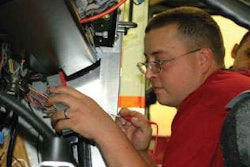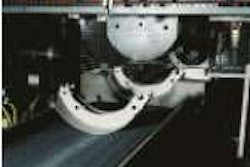One good turn deserves another

Everyone connected to the trucking industry knows it has an image problem. And this image problem isn’t new. Except a brief period in the mid-1970s when the public at large associated trucking with Pontiac Trans Ams, illicit runs of Coors beer out of Texarkana and anti-establishment Rubber Duck convoys rolling across the American West, trucking always has been on the outs with mainstream America.
This prejudice is undeserved, of course. We all know that if every truck in the U.S. sat idle tomorrow, the entire country would come to a screeching halt. And although trucks are big and scary-looking to somebody sitting in a Prius, the fact is trucks today are safer than they’ve ever been. But years of abuse have taken their toll on the trucking industry’s image. I wouldn’t go so far as to say that we’re cowed, but I do think that our industry has, over time, accepted a role of passivity. The industry has endured a multitude of regulations and cost hikes with good grace and uncompromising dedication.
In many cases, fleets have acted without government intervention to upgrade their tractors with cutting-edge safety equipment, including lane departure warning devices, traffic interval radar, proactive braking systems and rollover avoidance technology. And let’s not forget the wide range of environmental initiatives truck fleets have absorbed in the past decade: everything from exhaust gas recirculation engines with degraded fuel economy to anti-idling laws, complex California Air Resources Board regulations, SmartWay certification and selective catalytic reduction technology that, while impressive, drove the cost of a new tractor up considerably.
No one likes you, no one appreciates you, and no one stands up for you. So when government agencies like CARB, the Environmental Protection Agency and the Federal Motor Carrier Safety Administration – and on down to any small town council that bans exhaust brakes – piles on more regulations or costs, you take it with a grain of salt and get back to doing your jobs, supplying the goods and services that keep this country moving forward.
The industry has swallowed many demands with grace.
It’s time the trucking industry receive something in return. Last month, legislation was introduced to allow states to increase the limit on truck weights to 97,000 pounds on interstate highways within their jurisdictions; tractor-trailers would have to be equipped with at least six axles. Similar bills to allow vehicles above 80,000 pounds subject to state approval have been introduced in past sessions of Congress without success.
Not everyone in trucking wants higher truck weight limits, of course. Many – perhaps most – van truckload carriers oppose the 97,000-pound proposal because they fear that shippers will force their carriers to replace current trailers or retrofit a third trailer axle without any additional compensation. And unless the federal government allows longer trailers, the benefits even to the shippers will be limited because so many operations will cube out well before they hit 97,000 in a tractor-trailer.
These fears and concerns are legitimate, but it’s likely that in the coming years almost everyone in trucking will want as much trailer productivity as they can get because drivers increasingly will become scarce and tractors increasingly expensive. If this becomes the reality, carriers won’t have to worry much about compensation; tight capacity in the long run will ensure they receive a return on the investment. Already, many trucking operations are trying to shave weight in order to squeeze in more payload – often to offset the effects of environmental regulation. But that approach can go only so far.
Even if you don’t want or wouldn’t benefit from higher weight limits for commercial trucks, at least recognize and appreciate that legislation to grant them would represent a rare acknowledgement by the federal government that your industry can be trusted to operate safely with greater productivity. The time has come for trucking to get a fair shake. n
JACK ROBERTS is Executive Editor, Trucking of Commercial Carrier Journal. E-mail [email protected] or call (205) 248-1358.










